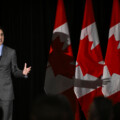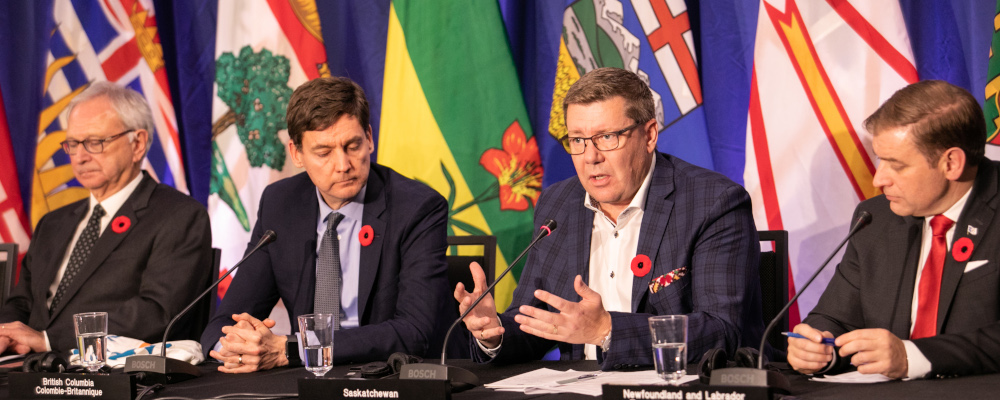In a bold move to defy the federal government’s signature climate policy, Saskatchewan has ceased collecting the carbon tax on home heating fuels. Starting January 1 this year, both natural gas and electricity are effectively exempt in the province.
This move was not made in isolation, and while other provinces have not followed suit, they have more options to do so than they might think.
This is all in response to the federal government’s earlier decision to exempt home heating oil from its own carbon tax, a transparently political move to curry favour in Atlantic Canada, where this fuel is predominantly used. It was a puzzling decision. The exemption—championed by Liberal MPs from the region—undermines the government’s own climate policy and encourages this kind of provincial action. Providing it selectively is also very unpopular.
Critics argue that it is unfair to exempt one type of home heating fuel but not others, especially when doing so is driven more by electoral ambitions than by a coherent policy rationale.
“If this is a painful tax going into winter for Atlantic Canadians, it’s a painful tax going into winter for everyone,” observed Alberta’s Premier Danielle Smith. “This is not partisan. All premiers are united in their call for fair treatment of all heating fuels, and many want to go further.”
However, only Saskatchewan responded with action: its Crown Corporation (SaskEnergy), which is responsible for distributing natural gas, simply stopped collecting the tax.There’s a more complicated approach to insult those who use electricity for home heating, which I won’t even try to explain.
Other premiers, like Alberta’s Premier Smith, have expressed a desire to follow Saskatchewan’s lead, but Smith notes that the lack of a provincially owned and controlled energy distributor makes that tough.
But in a notable turn of events, Saskatchewan announced plans to potentially use funds from either its general revenue or SaskEnergy to cover the federal carbon tax.
How could that work? Federal law mandates fuel distributors pay the carbon tax. This is normally passed on to consumers, of course, but it doesn’t have to be. Much like when some retail store pays the GST on your behalf during a promotion event, SaskEnergy or the Saskatchewan government could simply pay the carbon tax on behalf of consumers.
The financial implications of this strategy for the government are not yet entirely clear, but I estimate it could cost Saskatchewan around $250 to $300 million in 2024–2025. That’s not a trivial amount—it exceeds the provincial budget’s projected surplus for next year.
Despite the fiscal costs, this development illustrates an intriguing possibility for other provinces: simply use their own revenues to cancel the carbon tax on consumers. No Crown corporation required.
Take Alberta. The province boasts a fiscal capacity that far surpasses any other in Canada, providing it with significant financial flexibility. Its projected surplus this year is over $5.5 billion, and over $2.1 billion next year—even despite large spending increases. So, Alberta could conceivably adopt a policy where it provides bill credits equal to the carbon tax charges on all utility bills within the province.Alberta already provided universal utility bill credits to households in the province as one of its affordability measures recently, but these were lump-sum and unrelated to the value of carbon taxes paid. It would pay utility companies, who would then be required to pass the subsidy forward to consumers.
The legality of this is even cleaner than what Saskatchewan is doing. Fuel distributors would still collect and pay the tax to the federal government. But consumers would see the tax perfectly balanced by a credit on the same bill. This would, in effect, cancel out the carbon tax because it would be paid on their behalf.
The approach could also extend to gasoline taxes at the pump or any other type of fuel covered by the federal system. One can envisage a system where drops in provincial fuel excise taxes precisely counterbalance the federal retail carbon tax. The provincial tax could even evolve into a subsidy if necessary; again, effectively neutralizing the federal carbon charge.
There would obviously be some administrative and logistical challenges to overcome, but it could be done.
Importantly, this wouldn’t result in financial gains for the federal government at the expense of provincial budgets. All revenues collected, after all, are returned to consumers and other groups within each province.Each year, households receive a quarterly rebate directly deposited into their bank accounts that totals 90 percent of all carbon tax proceeds raised in their province.
None of this would be cheap. For Alberta, I reckon the cost in 2024 would be between $3 and $3.5 billion. Saskatchewan might face around $900 million, Manitoba about $700 million, and even Ontario could adopt this policy at an approximate cost of $6 to $7 billion. Clearly, these figures are substantial, and most provinces may not be financially equipped to undertake such a policy. Even Alberta, which is relatively better positioned, would find it challenging, though not impossible.

But there are options to limit the cost.
Provinces might consider a more focused policy, targeting only the carbon charge on home heating fuels. Or, though I haven’t worked this out in detail, a province could temporarily adjust the value of certain tax credits, like the basic personal amount, to effectively claw back much of the value of the rebate too.
None of this is particularly wise policy, to be absolutely clear. It’s all pretty silly. But the federal government has now opened the door to these kinds of provincial countermeasures.
My point is that Saskatchewan’s most recent admission that public funds may be used to cover the cost of the carbon tax for consumers provides an example to other provinces for how to follow suit.
The absence of a Crown Corporation is not an impediment. The provinces beyond Saskatchewan have more options than they might think. And what provinces decide to do next will shape fiscal and economic policy in Canada for years to come.
Recommended for You

The Notebook by Theo Argitis: Carney’s One Big Beautiful Tax Cut, and fresh budget lessons from the U.K.

Ginny Roth: How vacant liberal nationalism left Canada worse off than George Grant even imagined

Peter Menzies: Justin Trudeau’s legislative legacy is still haunting the Liberals

‘Our role is to ask uncomfortable questions’: The Full Press on why transgender issues are the third rail of Canadian journalism




